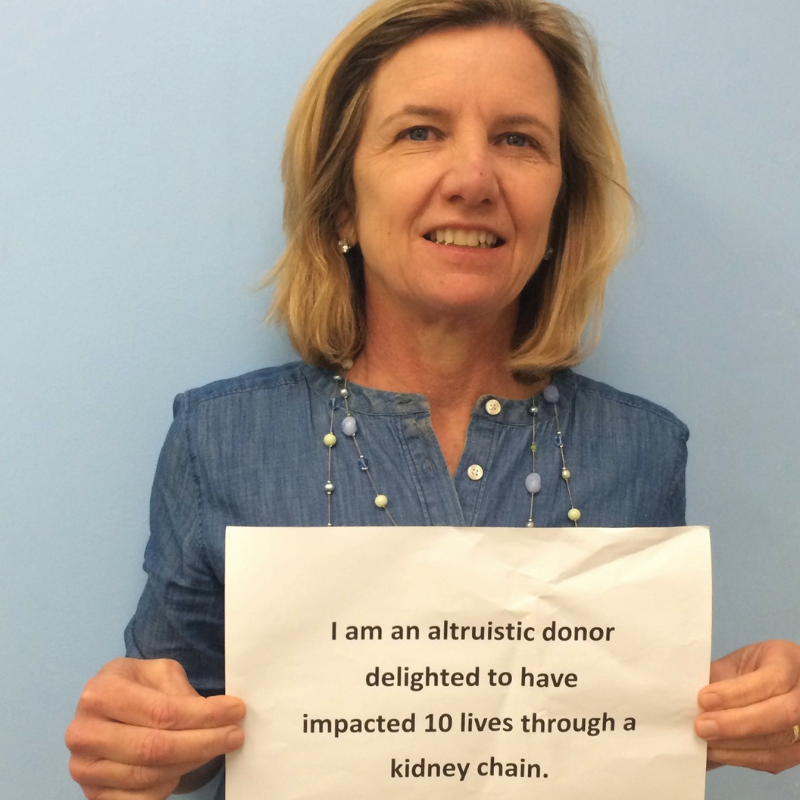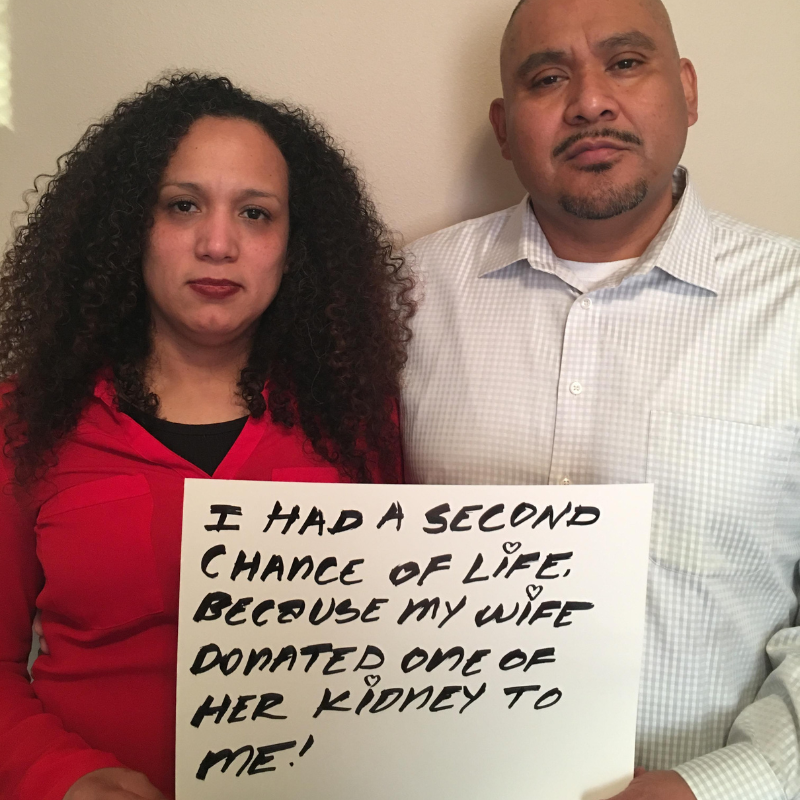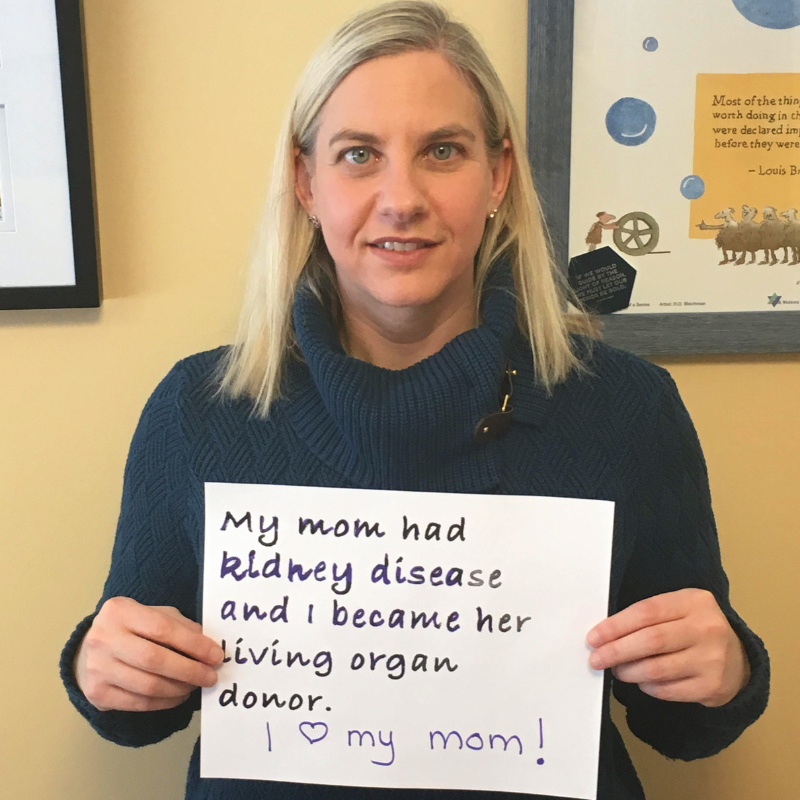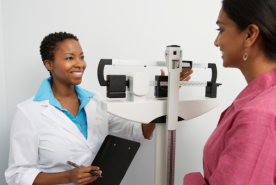April 20, 2023
If you have two healthy kidneys, you may be able to donate one to improve or even save someone else's life. What does the journey look like? How do you know if you're even eligible?
Three living donors are here to explain.
Making the choice
Many people decide to become living kidney donors when a family member, spouse, or friend experiences kidney failure to help improve the recipient's life.
"My father was my motivation. He was going through end-stage kidney disease. My sister and I both volunteered but my father gave us a lot of pushback. He said our lives were more important but we really wanted to do it," said Tania Kasongo. "Once we had a family discussion, we agreed to move forward with the process of a paired kidney exchange since my sister and I have different blood types than my father. After testing, we decided I would be the donor."
Others, like Mariam Goodwin, didn’t know their recipient but still donated altruistically.
"There were a surprising number of people in my life who were confused by my decision to become an altruistic kidney donor. I was grateful for my friends and the volunteers at National Kidney Foundation. These people, like me, live in the kidney world, so they supported me throughout the process," said Mariam. “If you haven't seen what dialysis and waiting on the kidney transplant list can be like, becoming an altruistic donor can seem like bananas. But, it cost me so little to help somebody else live untethered from a dialysis machine."
For Jennifer Brunes, the decision to donate came after the evaluation process ruled out her husband's brothers.
"I donated a kidney to my husband. We had two young children and I was very motivated to get him well," said Jennifer. "Initially one of his three brothers was going to donate but one had borderline high blood sugar, another was reluctant, and the third wasn't medically fit to donate. I am a universal donor so I was tested and we were compatible."
Get more general information about living kidney donation and connect with someone who’s already become a living donor who can share what it’s like to donate and give you support. Sign up for NKF Peers.
The evaluation process

After deciding to become a donor, you'll undergo an evaluation to ensure you are physically, financially, and mentally fit to donate.
"I was really surprised by some of the questions they asked during the evaluation," said Jennifer. "They asked how I would feel if the recipient didn’t take care of the kidney or if my kidney didn’t work. Those were things that I really hadn't thought about going into the process at all."
The living donor evaluation process:
- Financial consultation: The transplant center will review your finances and insurance coverage to make sure you can afford to donate since you may be responsible for travel expenses, lost wages, and some follow-up care.
- Psychological evaluation: The staff will make sure you understand all the risks and benefits of the surgery so you can make an informed decision.
- Medical: You'll go through a myriad of tests to make sure you are physically able to donate.
- Compatibility tests: A blood test will check the compatibility between you and the recipient. If you aren't a match, don't worry. Paired kidney exchange programs are available.
- Additional blood tests: These tests check for viral activity or transmissible diseases like HIV/AIDS or hepatitis.
Donating with mental health challenges
Mariam's main concern was passing the psychological evaluation since she deals with chronic anxiety and depression.
"The social worker at the transplant center took more time to talk through the process, asking if I had good coping mechanisms and if I was getting consistent care from a mental health professional," said Mariam. "I talked to the psychiatrist that was affiliated with the transplant center and appreciated their due diligence to make sure this wouldn't harm my mental health in any way."
Finding the time to donate
Tania worried about taking time off work and discussing her health with her boss. Luckily, her employer was incredibly understanding and connected her with a friend who donated a kidney to his wife.
"I have an immigrant mentality where you can't take any days off of work so I was nervous to tell my boss I needed the time to donate a kidney," said Tania. "She introduced me to a friend who connected me with another woman in a similar boat. She is Persian and understood the cultural aspect of not talking about your health. Having that support system helped."
Employers can also demonstrate their commitment to saving lives through organ donation by joining The Living Donor Circle of Excellence. This program helps mitigate financial barriers to donating by implementing an HR policy that pays employees at least 80% of their salary for four or more weeks of recovery time should they become living donors.
Learn how your company can make it easier for people to say “yes" to saving a life.
What are surgery and recovery like?

Having a kidney removed involves the same risks as any significant surgery, including;
- Pain
- Infection
- Pneumonia
- Kidney damage
- Blood clotting
- Collapsed lung
- Allergic reaction to anesthesia
Jennifer experienced pain and had a poor reaction to the anesthesia, but wouldn’t change the experience for the world since it meant seeing her partner healthy and happy.
"I’m a long-distance runner so I thought the surgery wouldn't be a big deal but I got bronchitis going into it. I could still donate but my body was already debilitated and worn out,” said Jennifer. “I thought I'd be out of the hospital the next day but I had a terrible reaction to the morphine and anesthesia. After the morphine was turned off, I felt better but was still tired and had a foggy mind for a few weeks. The hardest part was not being able to hold my young children. My highlight was visiting my husband after I could walk and seeing how well he was. It's been 17 years and our kidneys are working great."
Recovery is different for everyone but generally takes four to six weeks. Mariam expected to recover within four weeks but quickly learned to listen to her body and take it easy.
"When I woke up from the surgery, I was ecstatic. I was so happy even though I was in some pain. When the anesthesia started to wear off, I was really nauseous and couldn't keep food down. Physically I did not feel good but emotionally I was so happy," said Mariam. "A few weeks after the procedure, all the adrenaline and anticipation was over and I just wanted to get back to normal. I couldn't go back to my regular exercise routine or work. It was frustrating because I kept setting the bar too high and not meeting it. I was really fatigued and my recovery expectations were poorly paced. My advice is to set the bar really low."
Tania echoed that sentiment, recommending that all donors give themselves grace and time to recover.
"I wanted to go back home to support my dad but he didn't really need me after the surgery," said Tania. "I had to stop teaching aerobics because of the incision. We always push ourselves or put this fake pressure on ourselves to do more than we're capable of when we should just give ourselves some grace to move forward. Take your time and know that the positives outweigh any negatives when it comes to organ donation."
Learn more about kidney donation surgery.
Donor resources

Have you donated a kidney or are you considering it? We are here to help.
- National Kidney Registry: Become a voucher donor through a National Kidney Registry partnering transplant center and you may qualify you for reimbursement of lost wages and travel expenses related to your donation.
- Becoming a Living Donor Course: This program teaches everything you need to know about donating a kidney, including benefits and risks, how to start the evaluation process, the surgery, financial considerations, and emotional aspects of donation
- NKF Kidney Donor Community: Connect with other living kidney donors through our safe, online forum.
- NKF Cares: Call 855.NKF.CARES (855.653.2273) or email nkfcares@kidney.org to speak with a trained professional to get answers to your questions.
Looking for the latest in kidney research, care, and treatment?
Subscribe to Hot Topics in Kidney Health, the podcast that examines important kidney topics, brings in the experts, and provides actionable tips that you can start using today.



















